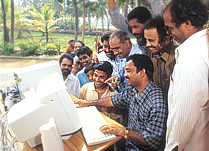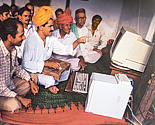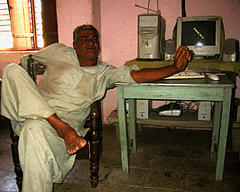e-Choupal – Empowering Indian Farmers via the Internet

The
e-Choupal, India’s largest rural ICT initiative, leverages information technology and the Internet to improve efficiency in the rural Indian agricultural sector, promoting greater information exchange and the creation of an alternative market structure. Although rural India suffers from a weak ICT infrastructure and poor literacy profile, the greater access and exchange of market and farming information provided by this initiative alleviates rural isolation and poverty by creating market transparency. This in turn improves the rural Indian farmers’ productivity and incomes.
Background
 |
| (Source: ITC Limited) |
Agriculture is vital to India, as it produces 23% of GDP and employs 66% of the workforce. Over the years, India’s agricultural productivity has improved to the point that the country is now both self-sufficient and a net exporter of a variety of food grains. However, most rural Indian farmers have remained quite poor, due to remnants of an archaic agricultural system based on small landholdings, scarcity-era regulations and inefficient market structures.
In mature agricultural economies such as the United States, farmers benefit greatly from easy access to market information and vertical market integration. However, the agriculture landscape in India is characterized by fragmented farms, weak infrastructure and the involvement of numerous intermediaries. In this system, crops are sold by rural farmers with small holdings to traders, who act as purchasing agents for corporate buyers at a local, government-mandated marketplace called a
mandi. Due to the lack of market information, rural Indian farmers have only an approximate idea of price trends and have to accept whatever the price offered them by the traders on the day that they bring their crops to the
mandi. As a result, traders are well positioned to exploit both farmers and buyers through practices that sustain system-wide inefficiencies.
Typically poor and often illiterate, rural Indian farmers generally have very limited access to information and education regarding improved farming techniques, that could enhance their yield. Farmers also typically do not have ready access to quality inputs, like sowing seeds, herbicides and pesticides, or to critical information such as accurate weather forecasts that could help them improve the quality of their crops. Such inefficiencies drastically increased transaction costs and slashed potential profits for the rural Indian farmers.
Implementation of the e-Choupal initiative
 |
| (Source: ITC Limited) |
Under the e-Choupal (which means "village square" or "gathering place" in Hindi) project, Internet centers are set up in rural Indian farming villages to provide farmers of soybeans, wheat, coffee, and shrimp with easy access to real-time information and the Internet. These real-time prices are collated from the
mandi via an arrangement with ITC Limited and are provided on ITC Limited's e-Choupal portal. The real-time market prices for wholesale products enable poor Indian farmers to better negotiate prices, and thus get the most out of their crops. The e-Choupal portal also provides the rural agricultural communities with information in their respective local languages on weather forecasts, education on improved farm practices and risk management, and as well as knowledge and purchases of better quality farm inputs. Through the Internet, farmers can even share best practices and consult with an agronomist by e-mail to seek assistance for problems associated with their crops. This ready access to localized, relevant information and resources greatly helps poor, rural Indian farmers to improve the quality of their crops and thus realize a better price for their efforts.
The e-Choupal project integrates the Internet centers (e-Choupals) into the livelihood of the rural Indian communities, using "click-and-mortar" principles, combining Internet and real-world intermediaries, to bridge the gap of real-time information access to otherwise poor, illiterate farmers.
Much of the project depends on a local representative. ITC Limited, the initiator of the project, selects a respected farmer from the village and trains him to host and facilitate the e-Choupal project. This trained farmer, called
sanchalak (which means "lead farmer"
), hosts the computer (with Internet connection via phone lines or VSAT) in his house, thus taking care of security and maintenance of the computer system. The
sanchalak, who has to take a public oath of service to the entire community, also serves as an intermediary for illiterate farmers to gain access to the requisite information for their farming needs. Each e-Choupal typically serves an average of about 600 farmers in 10 surrounding villages within about a 5km radius. The access to the e-Choupals remains free for the farmers, while the
sanchalak gains a small commission from ITC Limited for transactions via the e-Choupals.
Each e-Choupal is provided with a computer kit consisting of the following components:-
 |
| e-Choupal Setup (Source: ITC Limited) |
· A PC with a Windows/Intel platform, multimedia kit and connectivity interface
· Connection lines, either telephone (with a bit rate of 28.8-36Kbps) or VSAT (used in 75% of villages, providing 64Kbps inbound and 1Mbps outbound)
· A power supply consisting of an uninterruptible power supply (UPS) and a solar-powered battery backup
· A dot-matrix printer
The typical hardware setup for an e-Choupal costs about US$3,500 with an additional US$2,500 for staff, travel, communication, software and training.
Instigator and Funding Structure
I
TC Limited is one of India’s leading private companies, with annual revenues of US$2 billion. The e-choupal project was born in 2000 from ITC Limited's determination to capture more of the soybean crop, which it turns into oil to sell in India and into animal feed to export. In purchasing soybeans, ITC Limited has long been dependent on a static, archaic system where farmers sold their harvests to village traders or went to government markets, settling for whatever price was offered. ITC Limited had to buy separately from the traders or markets, with little quality control and high transaction costs. The idea of the e-Choupals was to allow the company to buy more directly from the farmers.
Launched as a business venture with social good in mind, the e-Choupal project was conceived with a pure business focus to create trusted farmer communities in rural Indian villages, who would facilitate sourcing of high-quality farm produce for the ITC Limited's fast growing agribusiness. The company had first considered trying to deliver information through television or radio. However, given the wide variety of Indian farms and farmers with differing knowledge, language, soil conditions and weather, the company believed that an Internet channel would provide for more tailored information for the respective rural communities.
The total benefits to the rural Indian farmers include lower prices for farm inputs and other goods, higher crop yield, better profits and a sense of empowerment, ITC Limited, for its parts, benefits from lower net procurement costs (it saves about 2.5% from the commission fees and transportation costs that it would otherwise pay to village traders who serve as its buying agents at the
mandi). It also gains more direct control over the quality of the farm produce it buys. The e-Choupal initiative also provides ITC Limited with direct access to the farmers, who provide feedback on information about conditions on the ground, thus improving planning and building relationships that increase the security of supply for ITC Limited. ITC Limited has reported that it generally recovers the equipment costs from an e-Choupal in the first year of operation and that the venture as a whole is profitable.
Monitoring and Evaluations
Launched in June 2000, e-Choupal has since become the largest initiative among all Internet-based interventions in rural India. e-Choupal services today reach out to more than 3.5 million Indian farmers growing a range of crops -- soybean, coffee, wheat, rice, pulses, shrimp -- in over 31,000 villages through 5200 Internet centers across six Indian states (Madhya Pradesh, Karnataka, Andhra Pradesh, Uttar Pradesh, Maharashtra and Rajasthan).
The e-Choupal project has been awarded the 2004 ICC-UNDP-IBLF World Business Award for furthering United Nations Millennium Development Goals, and the 2005 Development Gateway Award for contributions to the economic development of rural communities. It has also won the Stockholm Challenge Award 2006, which recognizes innovative and creative use of information technology to improve living conditions and increase economic growth in the underserved communities.
The e-Choupal initiative, however, has not been without challenges. ITC Limited had to convince Indian states to waive laws, born of India's protectionist socialist past, that require farmers to sell their farm produce only to government markets. The middlemen in the
mandi, who were now bypassed as a result of the e-Choupal initiative, also petitioned the government to outlaw such transactions. In the end, ITC Limited had to agree to buy its supplies via both the
mandi and the e-Choupal initiative.
The initiative has also run up against India's still-entrenched caste system, with some communities demanding two computers so castes would not have to mix. Other problems included infrastructural limitations, including power supply, telecom connectivity and bandwidth, as well as the challenge of imparting skills to the first-time Internet users in remote and inaccessible areas of rural India.
Next Steps
ITC Limited plans to further leverage its e-Choupal infrastructure in India to provide rural market research services and e-commerce, as well as to offer social services such as health advisories and e-governance (i.e. children receiving their exams results via email)
Conclusion
The e-Choupal model demonstrates that a large corporation can play a major role in recognizing markets and increasing the efficiency of an agricultural system, to benefit farmers and rural communities as well as shareholders. The case also shows the key role of information technology to help bring about transparency, increased access to information, and rural transformation.
Can the e-Choupal be Transplanted?
Other organizations have attempted to replicate the e-Choupal model in other developing countries, particularly in Africa. They have encountered differing levels of success, due to the lack of telephony and Internet communications in these areas, as well as the lack of appropriate social and commercial infrastructure backed by a large entity like ITC Limited. The e-Choupal model must be modified in these areas to adapt the model to local conditions. Such modifications include the need to use “market spies” to obtain market data instead of those provided by the government, and the use of mobile phone as the primary means to access information rather than Internet centers.
Here is a brief summary of some projects in Africa that are similar to e-Choupals:
Country
|
Variations in Implementation (as compared with e-Choupals)
|
Uganda
|
· This project introduced telecenters (1 – 2 computers with telephone lines). Farmers had to pay for use of Internet, and many farmers are too poor to make use of facilities.
· The program suffered from a lack of relevant information on the Internet in usable formats – due to unlinked databases, non-updating of websites, low literacy of farmers and multiple indigenous languages.
· The program drew on alternate means of checking market price information, available via SMS and radio, as well as from extension workers, via Foodnet, a website sponsored by the International Institute of Tropical Agriculture that posts harvest and market information on 28 key commodities.
|
Senegal
|
· The T2M system is operated by Manobi, a mobile & Internet value services operator for agri-business sector and rural communities.
· The T2M system provides price and status of products on market. It can be checked via Internet or mobile phones (which are used by farmers like calculators to check prices).
· Manobi independently collects prices, from food and goods sold in and around Dakar, and uploads them onto its central database twice daily.
|
Tanzania
|
· The First Mile Project is funded by the Swiss Government and linked to the Agricultural Marketing Systems Development Programme (AMSDP). This project aims to support small farmers and traders from rural areas to use mobile phones and Internet to share good practices and build market chains.
· Market prices and information are collated by “market spies”, locally known as shu shu shus, and shared via mobile phones and SMS to other members of his farmers’ association in their villages.
· A review in Mar 2006 (after 10months) estimated that the project’s activities contributed to a gross increase in income of participants of more than US$1.8million based on an initial investment of US$200,000.
|
Kenya
|
· Drumnet is a project of the non-governmental agency PRIDE AFRICA in collaboration with the International Development Research Centre, the University of Nairobi, Harvard University and Princeton University. This project seeks to establish rural information kiosks to provide free information to local farmers about the current prices of commodities.
· Research assistants and information brokers sample and provide commodity prices in both Nairobi’s Central Farmers Market and in Karatina.
|
References
AT





